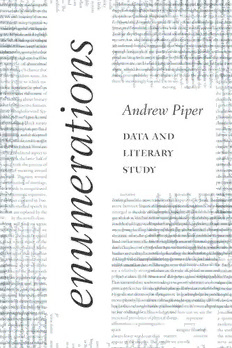
Enumerations: Data and Literary Study PDF
Preview Enumerations: Data and Literary Study
Enumerations Enumerations Data and Literary Study Andrew PiPer The University of Chicago Press Chicago and London The University of Chicago Press, Chicago 60637 The University of Chicago Press, Ltd., London © 2018 by The University of Chicago. All rights reserved. No part of this book may be used or reproduced in any manner whatsoever without written permission, except in the case of brief quotations in critical articles and reviews. For more information, contact the University of Chicago Press, 1427 East 60th Street, Chicago, IL 60637. Published 2018 Printed in the United States of America 27 26 25 24 23 22 21 20 19 18 1 2 3 4 5 ISBN- 13: 978- 0- 226- 56861- 4 (cloth) ISBN- 13: 978- 0- 226- 56875- 1 (paper) ISBN- 13: 978- 0- 226- 56889- 8 (e- book) DOI: https://doi.org/10.7208/chicago/9780226568898.001.0001 The University of Chicago Press gratefully acknowledges the generous support of the Social Sciences and Humanities Research Council of Canada toward the publication of this book. Library of Congress Cataloging-in-Publication Data Names: Piper, Andrew, 1973– author. Title: Enumerations : data and literary study / Andrew Piper. Description: Chicago ; London : The University of Chicago Press, 2018. | Includes bibliographical references and index. Identifiers: LCCN 2018003977 | ISBN 9780226568614 (cloth : alk. paper) | ISBN 9780226568751 (pbk. : alk. paper) | ISBN 9780226568898 (e-book) Subjects: LCSH: Criticism—Statistical methods. | Criticism—Data processing. | Digital humanities. Classification: LCC PN98.E4 P56 2018 | DDC 801/.95—dc23 LC record available at https://lccn.loc.gov/2018003977 ♾ This paper meets the requirements of ANSI/NISO Z39.48– 1992 (Permanence of Paper). to my parents Contents Preface ix Introduction (Reading’s Refrain) 1 1 Punctuation (Opposition) 22 2 Plot (Lack) 42 3 Topoi (Dispersion) 66 4 Fictionality (Sense) 94 5 Characterization (Constraint) 118 6 Corpus (Vulnerability) 147 Conclusion (Implications) 178 Acknowledgments 187 Appendix A 191 Appendix B 199 Data Sets 203 Notes 205 Index 241 Preface This book is part of a longer exploration of the relationship between technology and reading, one that has occupied me for most of my career. In Dreaming in Books, I studied how romantic literature made sense of the bibliographic re- organizations that were sweeping across Europe and North America at the turn of the nineteenth century. Romanti- cism was, in this reading, a movement deeply invested in understanding material and technological changes that we are in many ways still grappling with. Book Was There sought to understand the recent technological upheavals around books by paying attention to more embodied di- mensions of reading. Whether it is the touch or sight of the page or the places and practices of note- taking, game- playing, sharing, storing, or consuming books, I wanted to show how these experiences differ profoundly between print and digital media. Finally, Interacting with Print turned to the ways historical actors engaged with their reading mate- rial to produce new kinds of social communities, new mod- els of creativity, and new structures of knowledge. Written with twenty- two coauthors, Interacting with Print put theory into practice in an elaborate process of scholarly interactiv- ity of its own. This then is the intellectual background to the book you are reading. Enumerations is about how computation par- ticipates in the construction of meaning when we read. It argues that data and computation unquestionably have a role to play in understanding literature, but that the way we have so far approached this problem rests on a num- ber of flawed premises. The notions of distance, bigness, or ix
